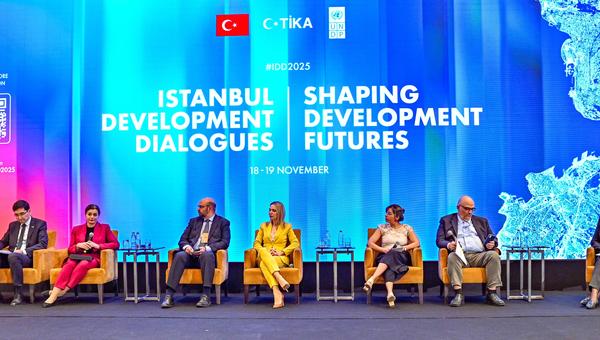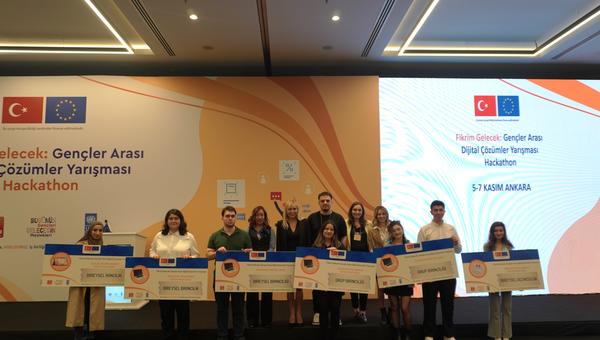Business to Social Cohesion Project
What is the project about?
The overall objective of the project is to support women businesses, entrepreneurs and women's cooperatives to cope with the impacts of the COVID-19 pandemic, build their businesses back better while strengthening business relations among refugee and host community members as a way to promote social cohesion and inter/intra-community solidarity. The project is funded by the Government of Japan with a budget of US$1.1 million and implemented by the United Nations Development Programme (UNDP) in cooperation with the Turkish Ministry of Industry and Technology General Directorate of Development Agencies.
Focusing on women entrepreneurs and women cooperatives, the project consists of two components aiming to strengthen commercialization, production and sale:
- To alleviate the effects of COVID-19 on businesses and women cooperatives through tailor-made business development services support,
- To increase access to employment opportunities of Syrians and host community members through entrepreneurship support.
What has been the situation?
Türkiye has not only accommodated the world's largest refugee population since 2014, but it has also served as a model for worldwide refugee policy debate and implementation. By 2020, the number of Syrians under temporary protection (SuTPs) have had surpassed 3.6 million, with women and girls accounting for 46% of the total. Furthermore, in 2016, the country granted SuTPs and International Protection Applicants access to work permits and legal employment. The international community has also made resources available to support Türkiye, which has made mid/long-term efforts, in accordance with the principle of responsibility-sharing, which is stressed in the Global Compact on Refugees. However, facilitating self-sufficiency for such many refugee households remains a difficult challenge, even in the medium to long term, especially after the COVID-19 pandemic reversed most of the progress made thus far. COVID-19 had cost 82 percent of migrants and refugees their jobs and income.
According to recent research, women in Türkiye had more severe pandemic-related employment disruption than men. The main challenges, as well as the negative socio-economic impacts of COVID-19, were revealed through extensive consultations and surveys with private sector actors. These included a lack of Turkish language skills, ecommerce skills, and information on legal frameworks regarding employment and entrepreneurship. Because they lack digital tools and infrastructure that will enable them to work remotely, such as e-commerce platforms to continue their sales/exports, during the COVID-19 pandemic, the lack of digitalization within Syrian-owned companies has harmed their business operations in terms of remote working, sales, and supply chains.
In response to the challenges outlined above, the project is being developed in order to address the risk of growing social tensions and identified socio-economic distress caused by the pandemic. It addresses the perceptions of socio-cultural differences, increasing social distance between communities, language barriers, decreasing social acceptance, competition for jobs, security concerns, misperceptions and misinformation about available services as well as the pressure on services and assistance as the factors affecting social cohesion in Türkiye.
What is our mission?
The project aims to increase the self-reliance of refugees and host community members with a specific focus on women through business development services and grants to alleviate the negative impact of the COVID-19 pandemic on existing cooperatives and entrepreneurs in realizing their business ideas.
In order to enhance the inter/intra solidarity and social cohesion, the Project will follow the same approach and gather and target both communities for business purposes. Following actions could be taken to promote social cohesion;
- Language barrier, if any, will be eliminated by interpretation services and also referring and following up those who need Turkish language trainings,
- Exploring opportunities to engage Syrians into women cooperatives,
- Creating an enabling environment to increase interaction and collaboration between two communities during the project activities.
How are we doing this?
The Project will target women entrepreneurs among Syrians and host community members, women cooperatives composed of Syrians and/or host community members, existing MSMEs led by Syrians, host community members or established as Syrian & Turkish joint ventures to support their livelihoods activities, especially in response to new business environment after COVID-19 pandemic. The project, by supporting the aforementioned target groups, will support new job creation through entrepreneurship, sustainability of the existing businesses and cooperatives in the time of pandemic and help them grow their businesses by tailor-made business development services.
The Project will build on the long-standing and close partnership of UNDP with the key national/central government agencies and local stakeholders such as the Ministry of Industry and Technology. The Project will also engage Regional Development Agencies that have a broad network of cooperatives and also local institutions, NGOs, Chambers of Industry and Commerce and Municipalities that are working with women and Syrian entrepreneurs and MSMEs.
How will Türkiye benefit?
- Beneficiaries will benefit from business development services support to improve and restructure their sales channels that are affected after COVID-19.
- Women cooperatives will be supported through technical consultancy to alleviate the effects of COVID-19.
- Enterprises and/or cooperatives will be integrated into supply chains of big firms, retailers or companies operating in manufacturing industry.
- Roadmap report will be developed that will include conceptual and action framework for identifying local products to be commercialized.
- An online platform (i.e. website) will be developed to facilitate the commercialization of the traditional/local products by taking stock of these products and making referrals to the producers.
- Bootcamp programs (each lasting for 2-weeks) will be organized for pre-selected women entrepreneurs that have solid business plan.
- After successful completion of the bootcamps, provision of tailor-made business development services throughout the project period for selected women entrepreneurs will be processed.
- Tailor-made business development services will cover consultancy services on legal and financial issues on doing business in Türkiye, mentorship, marketing, e-commerce, integration to the local, regional, and international supply chains, etc.
- Grants will be provided to cover the fees such as business registration fees, machinery and equipment, raw material, recruitment of new personnel, prototyping, marketing, subscription to the e-commerce platforms, work permit fees, laboratory and testing services, standardization, participation to the fairs, etc.
- Grants will be provided based on deliverables and in line with the business plan developed and implemented by the entrepreneurs.
- Networking events and bilateral meetings will be organized with the major retailers, ecommerce platforms, big companies, companies in manufacturing industry to support entrepreneurs in integrating into the major supply chains and/or e-commerce platforms.

 Locations
Locations





